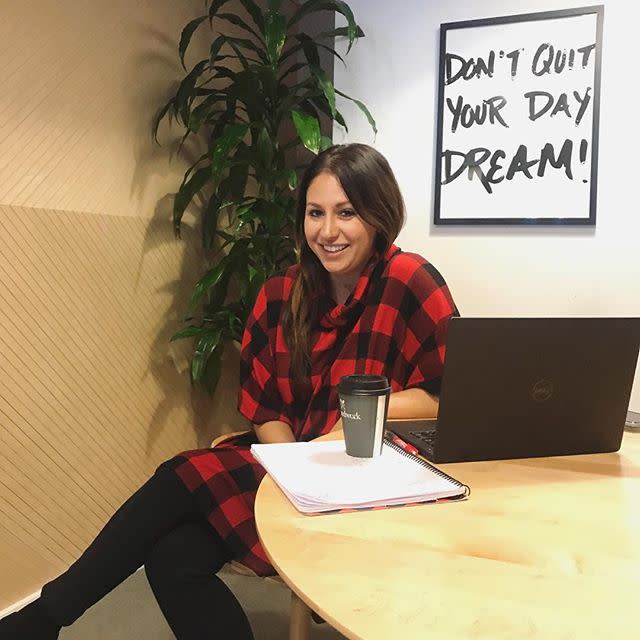The best internship tips from Lauren Berger, the Intern Queen
With the summer internship applications looming, Lauren Berger, known as the Intern Queen, spoke to Cashay about how to make your application stand out, make the right choice, and deal with rejection.
Berger is no stranger to internships, completing a whopping 15 while in college. But don’t worry: She recommends that just two will be enough for you.
Now, Berger has parlayed her experience into her Intern Queen and Career Queen platforms, posting internship and job opportunities and offering advice to young adults starting their careers.
“I started the company because I felt like there was a gap in the marketplace when it came to giving positive advice to young people,” Berger said.
Here are some of her top tips on internships.

Getting that first one
The first internship may be the hardest to get, because you have to fill up a resume and cover letter with relevant experience that you don’t yet have. Where do you start?
“Flip the script,” Berger said. “Lead with what you do have, instead of what you don't have.''
Focus on relevant courses, volunteer work, or clubs that you have done. Explain what you’ve learned and achieved and how this could relate to your first internship.
“A lot of students come up to me and say, ‘I have no experience. How am I going to get a job?’ then I start asking them about their experience,” Berger said. “Then you slowly start to hear that they have much more experience than they lead with.
Resume mistakes
Before getting to the interview stage, there are some big mistakes you should avoid while preparing your materials.
“The biggest mistake I see on resumes is there are multiple pages and they have the longest objective statements I've ever read,” Berger said. “They're terrible and should go away forever.”

With 2 in 5 hiring managers spending less than a minute on your resume, you have little time to make a good first impression, according to a CareerBuilder survey. Long resumes are instant deal breakers along with typos or bad grammar, unprofessional emails, and generic resumes.
When it comes to cover letters, the same rules apply.
“People write a generic cover letter and they send it to 500 people,” Berger said. “You can tell in two seconds that it was not written for you.”
Online footprint
While you’re researching the company you’re interested in, they are checking you out online, too. Social media and technology have changed internship and job applications the most, according to Berger.
“Everything is online,” Berger said. “People are looking at your social. You're looking at the company's social.”
Seven in 10 employers check potential hires’ social media presence, according to a CareerBuilder survey. Of those, almost 3 in 5 employers found content that turned them off from a candidate altogether.

Once you’re hired your social presence is likely still monitored with nearly half of employers using social media to research current employees. But that doesn’t mean you have to sanitize your social media, Berger said.
“Create content that's authentically you, that you're excited about and confident in,” Berger said. “If that works for the company, you're applying for, great; if it doesn't, on to the next.”
Getting a job is a two-way street and applicants should also look at the company’s social media presence and decide if it’s a right fit for them.
Negotiating pay
Your first internship may not be the best time to start negotiating pay, but what you can negotiate is the non-monetary benefits. These could include transit tickets, lunches, holidays, and sick days.
If the internship turns into an actual job, that’s when you can negotiate pay smartly. Research the role and the history of the position before discussing it with your managers.
“Once you get an entry-level job and you get a job offer, I’d encourage everybody to ask for more,” Berger said. “But I would also encourage you to be prepared for them to say no.”
Don’t create a bad dialogue with your employers. You should have an appropriate reaction ready if you want to keep the position.

Rejection happens
When applying for internships, entry-level jobs, or negotiating pay, you have to prepare not only for success but also for rejection, Berger said.
“When you're younger, you're taught that you're going to get rejected once during the job search and then that's it,” Berger said. “Rejection is going to come at all phases of your career.”
While some students may land the right job just a few months after college, many need a year and a half or more to find a position.
“There's a myth that as soon as you graduate, this magical job is going to pop up between one and three months,” Berger said. “That’s not the case for everybody.”
If you’re struggling in your job search, avoid the urge to jump into full-time positions that you don’t feel good about. Instead, get a series of part-time jobs until the right job for you comes along.
“I'd rather you go work a part-time job at Starbucks and be happy and really hold out for that position you want rather than take something you're not happy to do,” Berger said.
Read more information and tips in our Advice section





